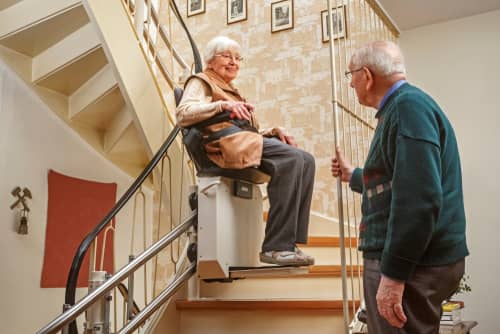
The everyday struggles disabled people face are something very few abled-people would have the courage to deal with.
This does not only refer to a lack of ramps and accessibility to most buildings, but also to the fact that disabled people have a harder time maintaining the overall quality of life that abled people have.
They have to adapt every aspect of living to their condition, starting from their homes. Here are just some of the things you should think about when adapting your home to better cater to your condition.
Important Things To Know When Adapting Your Home
Ramps and Elevators
Usually, one of the features that pose the most difficulty to people in wheelchairs are the stairs. That can be easily overcome by installing ramps for outside steps, and even inside for thresholds.
They will provide easy and safe access to all areas of the house, and will make moving around independently much more convenient. For easy floor to floor movement, you can always install an elevator.
They can be equipped with additional handrails for added safety. If your home has multiple levels and plenty of stairs, you will definitely benefit from installing ramps and an elevator.
Get a home assessment
Depending on the kind of disability you have, you will need to have your home assessed and adapted accordingly. Generally, a home assessment does not last longer than an hour or two.
An occupational therapist, nurse, or physical therapist may determine the extent of the changes needed for your home, and you actually may end up getting the adaptation for free.
Do extensive research on loans or grants you can get for home improvement and adaptation for people with disabilities, so that the financial aspect is not too big of a burden.
If your physical therapist determines that you would be better off in a different setting, or even a facility, look no further than a personal supported independent living homes, where you get all the perks of being in a well-supplied care facility, all the while having all the freedom of living independently in an adapted home.
Door Handles
Standard door handles can often be very difficult to operate for people with disabilities. A simpler and more convenient alternative would be to install the lever or push-button kind.
This will not only make your home more accessible, but it will make it possible for you to live independently in your own home. There are also automatic door openers for those that have a hard time opening any kind of door.
Lower Counters and Cabinets
Living with a disability often sheds a light on how lightly we take most things in our home. So, while raised kitchen cabinets are completely normal and often taken for granted in most homes, people with disabilities require a different kind of arrangement.
High kitchen cabinets are often simply unreachable to people in wheelchairs, so it makes sense to either lower them, or have only counters.
Additionally, lower the countertops, if necessary, to make them more comfortable to use. A customized cabinet or counter is something that will make your life much easier, and it is not only necessarily reserved for disabled people.
Also consider if you need any other adjustments done to your kitchen, like changing the flooring from slippery tiles to carpet, or if you need handrails.
Widen Doorways
Make sure that your doorways and halls are wheel-chair accessible. You will need that extra space to move freely through your home.
Not just that, but extra space in your doorways allows more light to enter your home, which helps fight depression, and allows for better visibility.
Additionally, wider door frames will come in handy if you need to move your furniture around, which will probably be the case if you are remodeling or changing the layout of your living space.
Increasing home security
Another important thing to note is home security. As terrible as it may sound, disabled people are much more vulnerable to home break-ins and robbery.
That is why we recommend installing a first-grade security system. That way you may rest assured that your home is protected from any intruders.
Additionally, think about installing more lights around your property, even your front and back garden.
With better vision you are less likely to have an accident, like miss a step, or hit yourself on a table corner, or even lose a small object in case you drop it on the floor, and it will be much safer to move around your property at night.
Summing up
Disabled people are faced with a lot of challenges, and it is our responsibility to help them as much as we can. This is why we have come up with some advice to think about when adapting your house for yourself or someone else with a disability.
Consult with experts, get an evaluation, and ask around if you are eligible for a financial grant of any kind. Always think about the needs of the disabled person, that means adapting anything that may be in the way or inconvenient.
